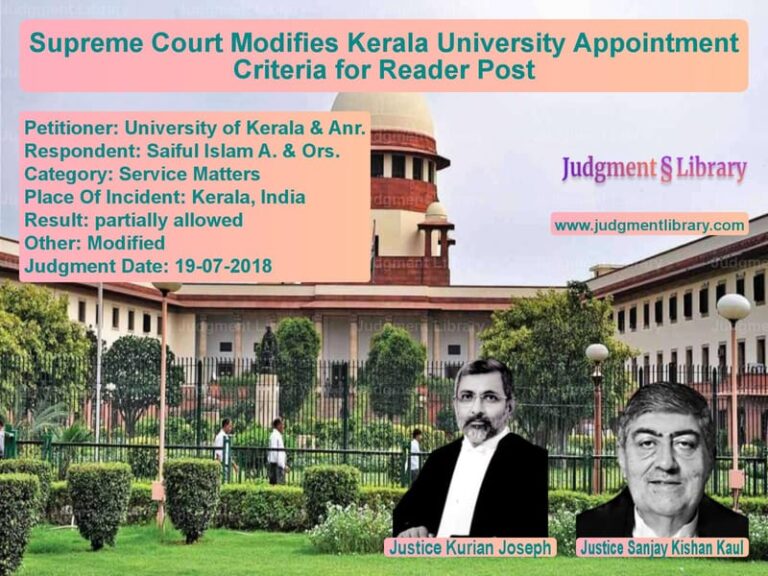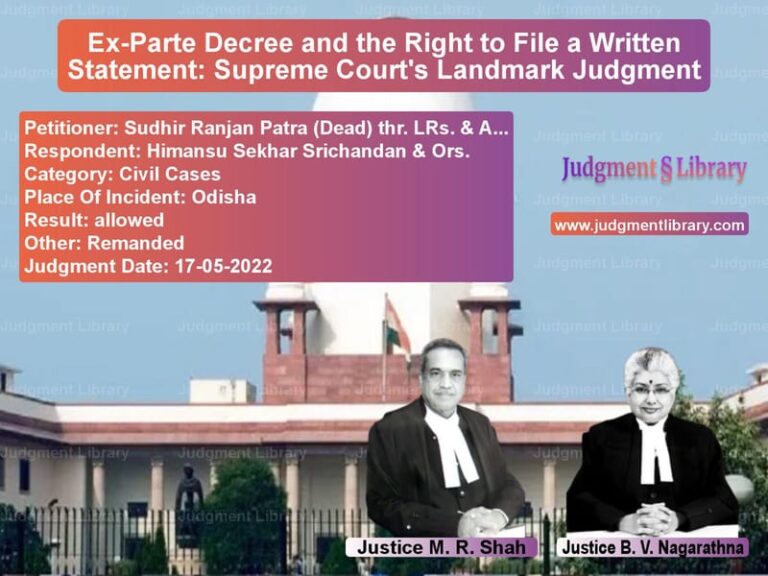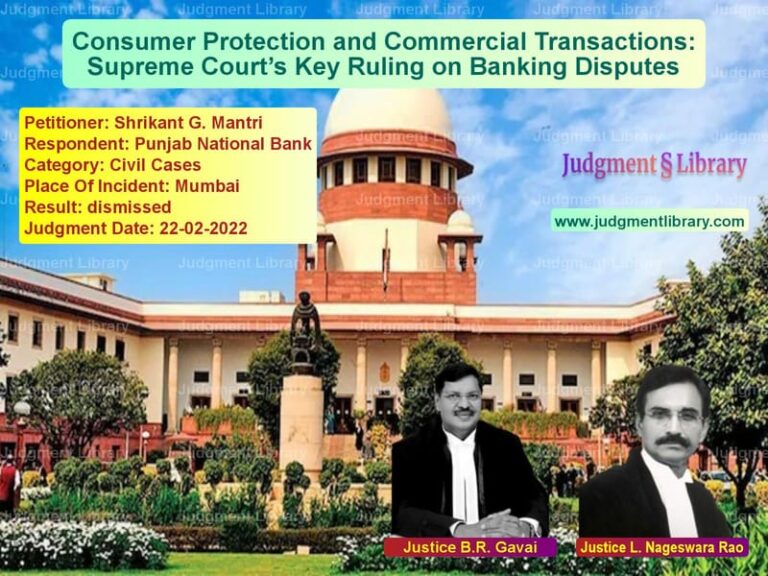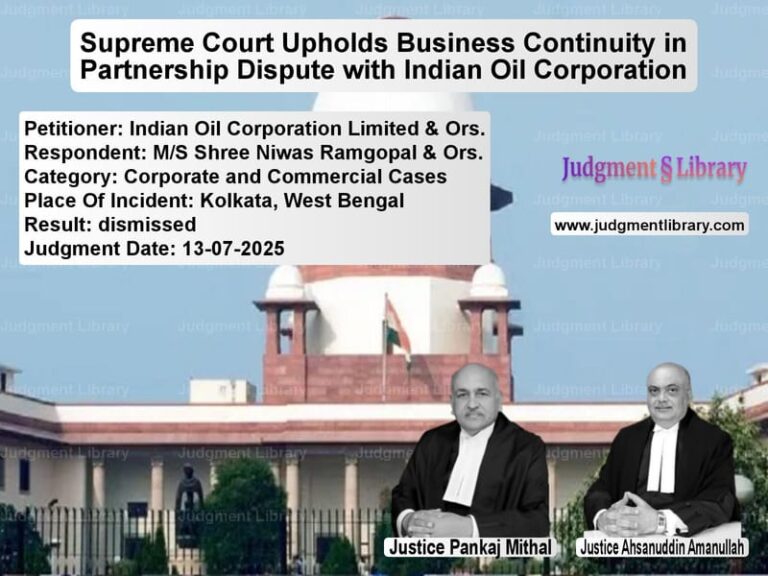LARSGESS Scheme and Employment Rights: Supreme Court’s Final Verdict
The Supreme Court of India recently ruled on the case of Union of India & Ors. vs. Bhagwan Deen & Anr., addressing the legal validity of employment claims under the Liberalized Active Retirement Scheme for Guaranteed Employment for Safety Staff (LARSGESS). The Court’s decision reaffirms the termination of the scheme and sets a precedent for similar cases in the future.
Background of the Case
The dispute arose from the implementation and subsequent termination of the LARSGESS scheme, which was introduced by the Indian Railways to facilitate the voluntary retirement of certain railway employees while ensuring employment for their dependents. However, the scheme was later criticized for being unconstitutional and was ultimately abolished.
The respondents in this case, Bhagwan Deen and another, had approached the Central Administrative Tribunal (CAT), seeking employment benefits under the LARSGESS scheme. The Tribunal ruled in their favor, directing the Railways to consider their employment claims. The Union of India then challenged this decision in the Delhi High Court, which upheld the CAT’s ruling. Aggrieved by this decision, the Union of India filed an appeal before the Supreme Court.
Legal Issues
- Whether individuals could claim employment benefits under the LARSGESS scheme after its termination.
- The validity of previous judicial decisions upholding employment rights under the scheme.
- The impact of the Punjab & Haryana High Court’s ruling, which had criticized and led to the termination of the scheme.
Arguments by the Parties
Arguments by the Union of India (Petitioners)
- The LARSGESS scheme had been declared unconstitutional by the Punjab & Haryana High Court, and the Supreme Court had refused to interfere in that ruling.
- Following the termination of the scheme in 2019, no further employment rights could be claimed under it.
- The Central Administrative Tribunal and the Delhi High Court erred in granting relief to the respondents based on an already abolished scheme.
- The petitioners highlighted that similar cases had been rejected in other courts following the scheme’s termination.
Arguments by the Respondents
- The respondents argued that they had a legitimate expectation of employment under the LARSGESS scheme, as their applications had been filed before its termination.
- They contended that the termination of the scheme should not affect individuals who had already qualified under its provisions.
- The respondents maintained that denying them employment under the scheme would be arbitrary and unfair.
Supreme Court’s Ruling
Key Observations
- The Court noted that the LARSGESS scheme had been criticized for violating constitutional principles and was subsequently terminated.
- It emphasized that various petitions challenging the scheme’s termination had been consistently dismissed.
- The Court ruled that no further employment claims could be entertained under the abolished scheme.
Final Decision
The Supreme Court allowed the appeal by the Union of India, set aside the decisions of the CAT and the Delhi High Court, and dismissed the respondents’ original application seeking employment under LARSGESS.
“Viewed thus, the Tribunal was not justified in passing directions in the instant matter and the High Court was in error in rejecting the challenge raised by the appellants.”
Implications of the Judgment
For Employees Seeking Benefits under LARSGESS
- The ruling makes it clear that no further claims can be entertained under the abolished scheme.
- Individuals who had pending applications before the scheme’s termination have no legal right to employment under LARSGESS.
For Indian Railways and Government Policies
- The judgment upholds the government’s decision to terminate schemes that do not align with constitutional principles.
- It reinforces the need for legally sound employment policies in public sector undertakings.
For Judicial Precedent
- The ruling establishes a precedent for courts to reject claims based on discontinued government schemes.
- It affirms that legal challenges against the termination of unconstitutional schemes are unlikely to succeed.
Conclusion
The Supreme Court’s judgment in Union of India & Ors. vs. Bhagwan Deen & Anr. reinforces the principle that no employment claims can be made under an abolished scheme. It upholds the government’s decision to discontinue LARSGESS and provides clarity on similar employment-related disputes. This ruling ensures that public sector employment policies remain aligned with constitutional principles and legal standards.
Petitioner Name: Union of India & Ors..Respondent Name: Bhagwan Deen & Anr..Judgment By: Justice Uday Umesh Lalit, Justice S. Ravindra Bhat, Justice Pamidighantam Sri Narasimha.Place Of Incident: India.Judgment Date: 05-04-2022.
Don’t miss out on the full details! Download the complete judgment in PDF format below and gain valuable insights instantly!
Download Judgment: union-of-india-&-ors-vs-bhagwan-deen-&-anr.-supreme-court-of-india-judgment-dated-05-04-2022.pdf
Directly Download Judgment: Directly download this Judgment
See all petitions in Public Sector Employees
See all petitions in Recruitment Policies
See all petitions in Employment Disputes
See all petitions in Judgment by Uday Umesh Lalit
See all petitions in Judgment by S Ravindra Bhat
See all petitions in Judgment by P.S. Narasimha
See all petitions in allowed
See all petitions in Quashed
See all petitions in supreme court of India judgments April 2022
See all petitions in 2022 judgments
See all posts in Service Matters Category
See all allowed petitions in Service Matters Category
See all Dismissed petitions in Service Matters Category
See all partially allowed petitions in Service Matters Category







